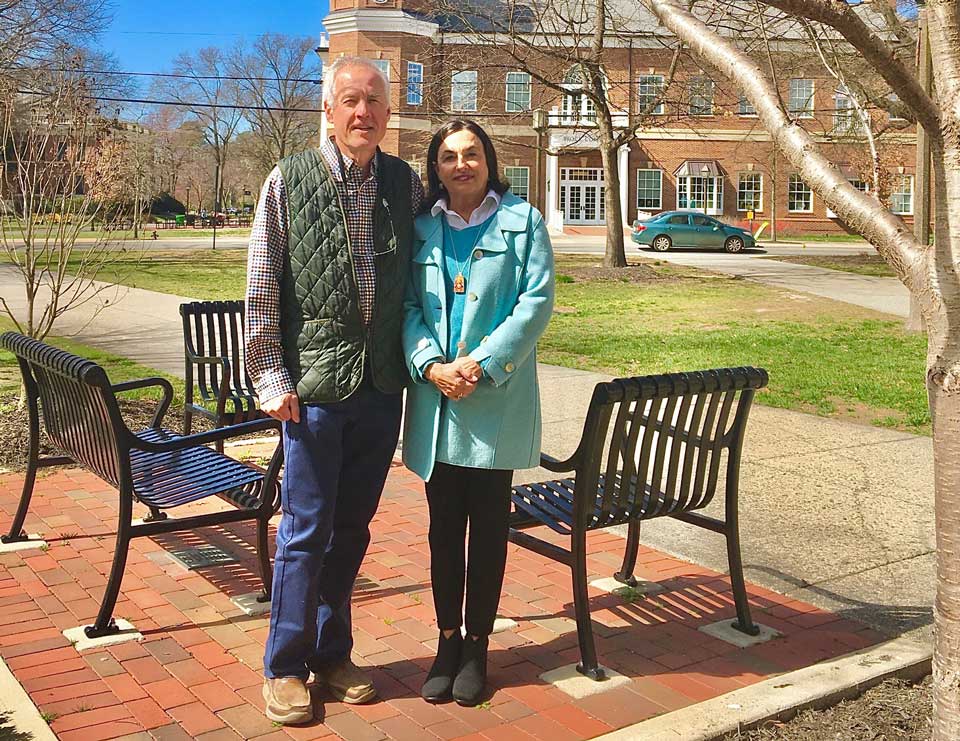"To all the people in Japan," Andy Anderson says into a camera, holding an American flag.
By his side is Jeanne, his wife, with a Japanese flag. "You are not alone," she adds.
They are then joined by a group of 30 or so college students. "Our thoughts are with you, wishing for good health."
Then, as a finale: "GANBARO!"
The word is Japanese for "We can do this," or "Let's fight." It became something of a rallying cry in the aftermath of the 2011 earthquake and tsunami that devastated northeastern Japan. The Andersons hope it can serve a similar role nine years on, as the world grapples with the coronavirus pandemic.
In 2011, the Andersons experienced unspeakable tragedy. Their 24-year-old daughter, Taylor, went missing in Ishinomaki, one of the cities hit hardest by the tsunami. She had been teaching English to school children there as part of the Japanese government-sponsored JET program.
I was stationed in New York in 2011. Right after the tsunami, I flew to Richmond, Virginia to interview the Andersons. They wanted to spread news in Japan about their missing daughter, in the hope that it would help her be found. A few days later, as Andy was getting ready to leave for Japan to search for Taylor himself, he got a call from the US embassy in Tokyo. A body had been found and it was likely his daughter's.

Andy flew to Ishinomaki to identify the body. It was a difficult trip but he says the overwhelming kindness he was greeted with helped him make it through. He says many people came up to him to express condolences. This was despite the fact that they were dealing with their own tragedy, grieving their own family members. Andy says it was an inspiring experience.
"We knew Taylor would want to help them if she was still alive," he says. "She would stay there to try to help. So we felt like we should fill that role."
It was during his trip to Ishinomaki that Andy got the idea of launching a fund in his daughter's name to "help students, families, and schools recover."
In the nine years since, the Taylor Anderson Memorial Fund has provided fifteen schools in Ishinomaki with "Taylor Bunko," or Taylor's Libraries. They are sets of English books with wooden shelves, specially made by craftsman Shinichi Endo, who lost three children in the tsunami. The fund has also been awarding scholarships to the Sendai YMCA Hotel and Confectionary school to students from families that are struggling financially.
When I visited the school in February, 11 scholarship recipients were enrolled in classes. Half were set to graduate in a month's time, with jobs already secured.

Taylor's motto as a teacher was "Follow your dream" and many of her former students say she always encouraged them to do what they love. Andy says this same belief forms the basis of the scholarship program.
"Taylor was following her own dream, learning the Japanese language, going to the country to teach children," he says. "She wanted her students to know they too can do that."
Taylor's legacy also lives on at her alma mater, Randolph-Macon College in Ashland, Virginia. Since her death, the school has significantly increased its Japanese language and culture programs. It has been awarded grants from various US and Japanese government and private funds, such as the TOMODACHI Initiative and the Kakehashi Program, and has used this money to hire faculty and organize trips to Japan. Since 2012, over 200 students and staff members have visited the country.
BJ Camano, a junior, took part in one of these trips last year. He says a visit to Ishinomaki left a particularly big impression on him.
"We saw the resilience of the people and how much they were able to rebuild," he says.

He says he hopes he and others who have participated in these trips "will be able to continue to bridge the two countries," as Taylor herself wished to do.
This year, the coronavirus pandemic has forced Randolph-Macon to cancel some of these programs. On a recent trip to campus, the Andersons met a group of disappointed students who had been scheduled to visit Tokyo in March. That's when they decided to record a video message to the people of Japan.
"With their kindness and friendship, they helped us through the last nine years," Andy says. "We want to return the favor."

Since the Andersons recorded the message with the students, Randolph-Macon college has suspended in-person classes and all campus activities throughout the spring term due to the coronavirus pandemic.

